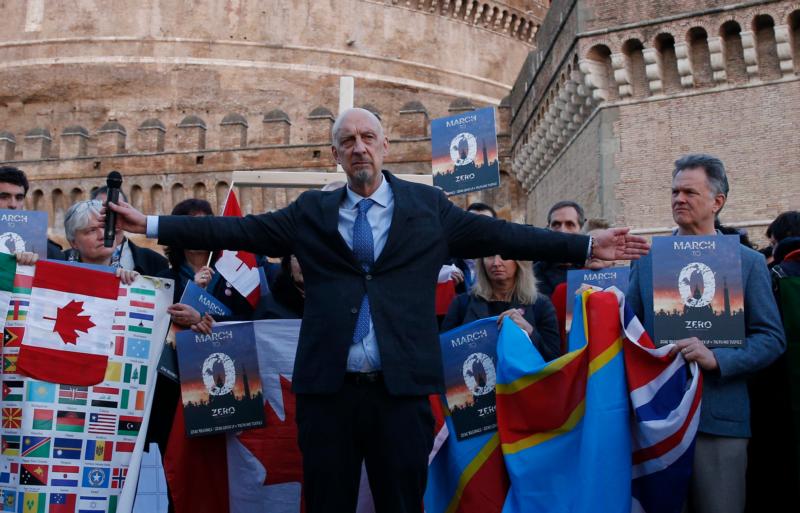By Elise Harris

ROME (Crux) – As part of Pope Francis’s high-stakes summit on clerical sexual abuse this week at the Vatican, during Thursday’s opening session he released a list of 21 “points for reflection”- including a couple that didn’t necessarily sit well with abuse survivors, who say they fall short of the Catholic Church’s pledge of zero tolerance.
One of those points, which Pope Francis said he got from suggestions made by bishops’ conferences ahead of the summit, dealt with releasing names of accused priests. Another concerned defrocking clergy guilty of abuse, and still another with listening structures so bishops can hear victims’ stories.
In comments following the opening session of Pope Francis’s Feb. 21-24 summit on the protection of minors in the Church, abuse survivor and co-founder of the U.S. branch of the Ending Clergy Abuse advocacy group, Peter Isely, said the pope’s list contains “not-very-concrete points,” despite a statement from Pope Francis earlier in the day that people want “concrete, effective” measures.
The suggestions are not a sign of progress, Isley said, because “they don’t go anywhere, they’re not moving the line anywhere.”
“There’s nothing different in here than there was yesterday. Where is it in these points that if you’re a bishop or a cardinal and you’ve covered up child sex crimes, that you’re going to be removed from the priesthood or that any action will be taken against you?” he said.
“That’s not in here at all, so that’s not accountability and that’s not zero tolerance,” he said.
Speaking of point 15 on Pope Francis’s list, which suggests that the Church’s traditional principle of “proportionality of punishment with respect to the crime committed” should be observed and asked for “deliberation” on defrocking, Isely said the idea that some priests guilty of abusing children would not lose their clerical status is “unacceptable.”
In a news conference after Thursday’s morning session, Archbishop Charles Scicluna of Malta, a former Vatican prosecutor on clerical abuse cases and a leading figure in the protection of minors in the Church, said that dismissing abuser priests from the clerical state is not always a given, but in his view, should happen on a “case-by-case” basis.
When a priest is found guilty, “then you talk about penalties, and removal from ministry is part of that,” he said, but added that when it comes to an 80-year-old cleric, the Church “may not want to dismiss him from clerical state.” Instead, the Church might prefer to put him in a retreat or retirement home where he would not be a danger to anyone, but he would also receive the care he needs.
Archbishop Scicluna also cautioned against publishing the names of priests accused of abuse prematurely, before allegations are found to be credible.
“You need a credible allegation,” he said, “because there is also need for privacy” and the right of the accused to “a good name” until found guilty. But when a priest is found guilty, “the public should know, because it is helpful for prevention.”
“It is legitimate to declare that there are credible allegations, but to put the names out for any allegation is premature,” he said.
The comment reflects point 14 on Pope Francis’s list, which states that the presumption of innocence in abuse cases ought to be applied in the ecclesial setting and called for the prevention of the publication of accusations “even by dioceses, before the preliminary investigation and a definitive condemnation.”
Isely urged the Vatican’s Congregation for the Doctrine of the Faith to release the some 4,000 names of priests credibly accused of clerical abuse, saying that to do so is a step toward transparency and zero-tolerance.
Noting how Archbishop Scicluna during the news briefing had said Francis’s 21 points were a “roadmap” for future action, Isely said “the roadmap is in here: it’s a circle, it’s not going anywhere. You can’t set your GPS unless you’ve inputted zero tolerance, and that’s not what this is.”
Apart from Pope Francis’s 21 points, other topics that came up on day one were the need for bishops to meet with victims, the need to accompany them and their families, the need for ongoing formation for priests and seminarians in child protection, as well as collaboration with civil authorities and judicial topics, with several recommendations being made for legal and procedural actions.
Speaking to the press, Archbishop Mark Coleridge of Brisbane, president of the Australian bishops’ conference, said he was especially affected by victim stories shared that morning.
“I’ve been listening to survivors for a very long time, but I was far more moved this morning than I expected to be,” he said, adding that they gave “a whole new power and dimension to the meeting and started things off on the right tone.”
Archbishop Scicluna stressed the need for “a culture of disclosure” rather than a “culture of silence,” which, he said, in many cases has been the norm, and which he called “a very understandable but primitive and unacceptable defense mechanism.”
Bishops, he said, must have “the courage and humility to face misconduct when it happens and to face this right from the beginning,” stressing the need to collaborate with civil authorities.
As far as dioceses themselves, “it’s very important that local protocols are revised as a result of this meeting,” he said, adding that the pope’s 21 points are key.
German Jesuit Father Hans Zollner, a member of the Pontifical Commission for the Protection of Minors and a member of the summit’s organizing committee, cautioned against setting expectations too high, saying “many people expect concrete outcomes” from the summit.
“That will take some time, but there are things that hopefully will be delivered. This is something (Pope Francis) has charged us with,” he said, adding that no matter what happens, there will be “a call to common action.”
